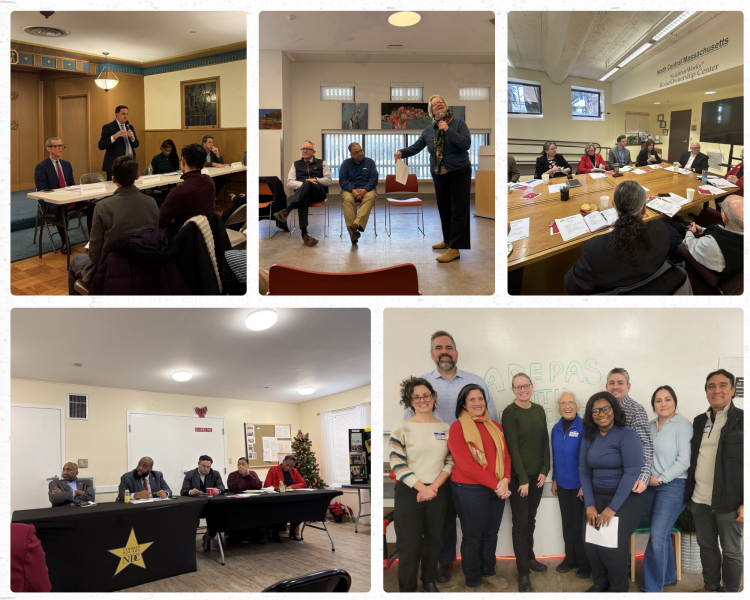The Massachusetts Department of Public Health (DPH) has announced the 2022 awards of the Massachusetts Community Health and Healthy Aging Funds (MA CHHA Funds or The Funds). As part of these awards, DPH, the Executive Office of Elder Affairs (EOEA) and the implementing partner Health Resources in Action, Inc. (HRiA), will join with the Massachusetts Association of Community Development Corporations, the Southeast Asian Coalition of Central Massachusetts (SEACMA), Community Teamwork, Community Development Partnership (CDP) and 20 other organizations across Massachusetts and more than 35 of their community partners, including non-profit community-based organizations, municipalities, and coalitions. All of these organizations have committed to leading efforts to address the root causes of health inequities by disrupting systemic barriers to health and tackling institutional and structural racism head-on. Due to the pandemic, the need to support such efforts is even more imperative.
In total ~$15.6M in grants will support 24 lead organizations and 35 of their partner organizations implementing strategies, ultimately impacting 183 cities and towns across the state. CDP’s project will be focused on the Lower Cape community and Community Teamwork will be focused on Lowell residents. SEACMA’s project will impact health outcome throughout Central and Western Massachusetts and MACDC’s efforts will be geared towards Massachusetts’ Gateway Cities.
“The trust that the MA CHHA Funds (or The Funds) has put in MACDC and our members is indicative of an understanding of the huge impact that people’s economic conditions have on their health outcomes. Community development has a key role in improving those economic conditions and thereby improving health equity,” says Elana Brochin, MACDC’s Program Director for Health Equity.
The goal of The Funds is to work with community partners to disrupt barriers to health, increase awareness and address the impact of structural racism on population health, and to create long-term, meaningful changes in population health outcomes.
The Funds invests in initiatives in three core areas of focus including those:
-
Working on long-lasting, community-driven policy, systems, and environmental changes that will make it easier to lead healthy lives and which will reduce health inequities such as racial patterns of segregation in communities and a lack of affordable housing production;
-
Organizing and coordinating Community Health Improvement Planning efforts which convene multi-sector partnerships to collectively set and address community health goals, and;
Recognizing the complex ways in which systems impact health, the investments will support a wide range of activities across the Commonwealth.
The following are descriptions of the projects on which MACDC and our members will be embarking with support from the Massachusetts Community Health and Healthy Aging Funds:
CDP’s Lower Cape Community Housing Partnership addresses housing insecurity in the Lower Cape region equipping residents, business owners, community leaders and local officials with the knowledge and skills needed to support the creation of more homes in the eight towns of the Lower Cape. With this funding CDP will use the community organizing component of the program to support systems change around land use policies in order to increase housing production.
Community Teamwork will establish Advancing Housing Equity for Seniors project, in partnership with Age Friendly Lowell, Coalition for a Better Acre, REACH Lowell, and Community Teamwork’s AmeriCorps Senior Programs to address the root cause of housing instability among low-income seniors.
SEACMA’s Health Aging-In-Place project is planning to address interconnected barriers to aging- in-place in a way that is secure and healthy. SEACMA will assess, plan, and implement culturally relevant service expansion for Southeast Asian elders in Central and Western Massachusetts; advocate for the implementation of culturally relevant services and programs with partner organizations; and engage and train elders and their caregivers for self-advocacy.
MACDC’s Housing Quality and Health (HQH) Equity Initiative will tackle poor housing quality and associated housing instability, and address the corresponding racial health inequities, by improving existing housing stock in Gateway Cities.
“Through partnership with Massachusetts Community Health and Healthy Aging Funds, MACDC and our members will have significant positive impact on health outcomes in our communities throughout the state,” says Brochin.
The Massachusetts Community Health and Healthy Aging Funds were created in January 2017 when DPH completed a landmark revision of its Determination of Need (DoN) regulation, which authorized the creation of these Funds. DPH provides overall guidance to the Funds and Health Resources in Action, Inc. acts as a fiduciary and implementing partner. The Massachusetts Executive Office of Elder Affairs (EOEA) partners with DPH to support the Healthy Aging Fund.










